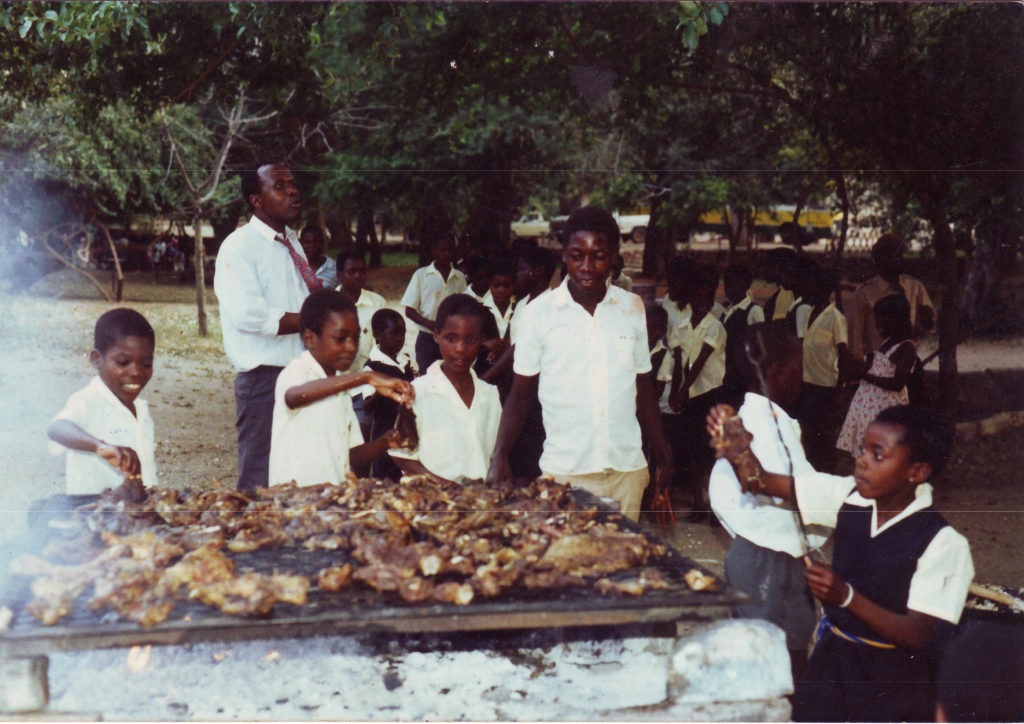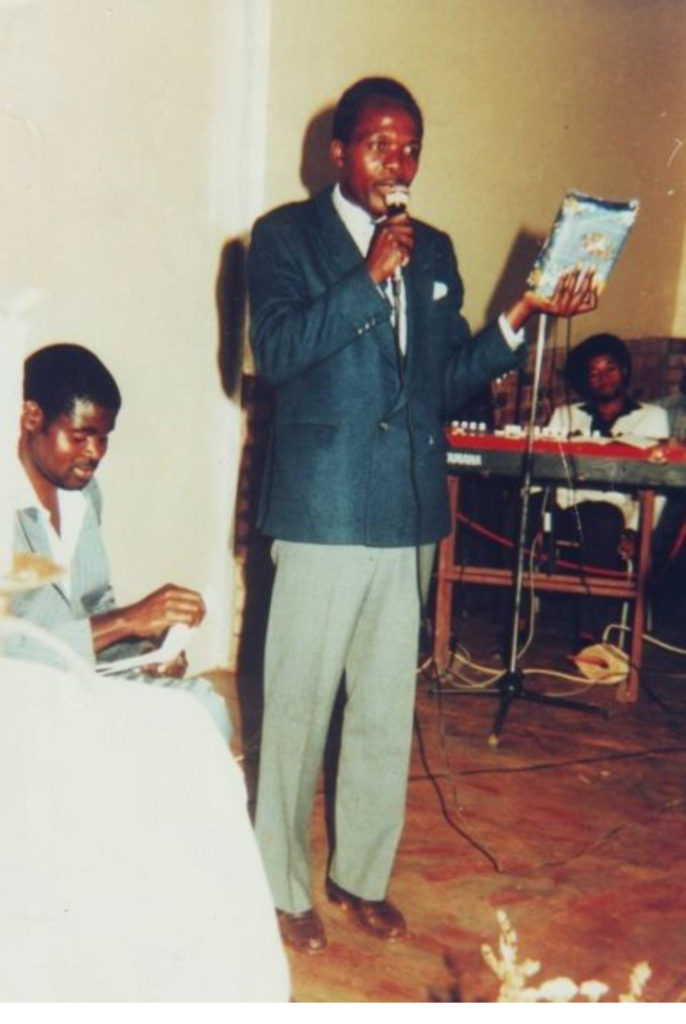
Benedict had four great loves in his life, his family, his Church and especially the youth, his school and finally his community. He was fully devoted to all of them. In the words of his close friend and relative, Joseph Netshikulwe, “He was full of enthusiasm to do the right thing at school, in the Church and in the development of the community”. Joseph goes on to say that Benedict, “was always offering himself if there was something to be done”. His brother, Thanyani, gives the motivation behind Benedict’s readiness to be of service to others, “He had humanity or botho or ubuntu, to care for other people, to put yourself in other people’s shoes and to try to help wherever you can”.
People remember him as a person who loved his community and wanted to make a difference. They wished that he would have lived longer to serve and develop his community. In an interview with the Sunday Times (08/02/2015) one of Benedict’s friends, Simon Khaukanani made the comment, “If Benedict were still alive we could have seen a lot of development in both Mbahe and Nweli”. Another person who worked closely with him, Michael Maliavusa, said that, “His thinking was very different to others. Benedict was about the development of people. He was against people misleading others. He wished well for all people. This made him seem like a revolutionary in the village”. Joseph Netshikulwe gives us an example of Benedict’s spirit of initiative and enterprise, “He was concerned that the children of Mbahe had to travel great distances to go to secondary school. Benedict encouraged the building of a secondary school”. This new secondary school was built at Mbahe while Benedict was still alive.
Benedict’s love for young people extended beyond the members of the Church to the whole community. He had a great interest in sport including athletics, tennis, hockey but especially soccer. He saw it as a good way to help young people build up character and keep away from criminal and other harmful activities. In the mid-seventies he was a founding member of the Mbahe Eleven Computers Soccer Club. Initially all went well with the team winning most of their games. But then they began to lose matches which led to the club officials having to do some soul-searching. They came up with the cultural solution of resorting to the use of muti to get back to a winning streak. Chris Mphaphuli tells us that those who started the club, “wanted to use muti to boost the boys to win matches. Benedict was against the idea”.
Benedict strongly and publicly opposed this course of action. He said that the right solution was for the team to keep on practicing more and more, have a positive mental approach to their games and to pray for success. His advice was not heeded and he decided to leave the club and helped to found a new one, the Mbahe Freedom Rebels which later became known as United Brothers. He made sure that these would steer clear of witchcraft and muti. These practices Benedict regarded as totally contrary to his Christian faith. This was a defining moment in Benedict’s life as a Christian. Here he refused to compromise his faith by bowing to the pressure coming from his culture, to participate in the practice of witchcraft. This was a preparation for a more severe testing of his faith in the following years.

Benedict cultivated a large garden of over two hectares where he grew a variety of fruit and vegetables as well as mealies. He enjoyed gardening and was very successful at it. He sold the produce to the local markets and to the people of the area. At times he gave some away without charge to very needy people. As a person of honesty, integrity and generosity he believed in charity but not in stealing. According to his cousin Samuel Daswa, “The only thing he was against were the children of the neighbours who were stealing. Whenever he brought oranges, he would tell their parents, ‘I am giving you these things because whenever you steal from me you are not stealing from me, you are stealing from God’”.
Here again the issue of witchcraft arose. Some people began to wonder how Benedict could possibly find the time to develop such a fine garden and at the same time be an effective principal of a school. He regularly worked early in the morning and after school until late in the evening. Baldwin Mutshutshu tells us how Benedict developed his garden by, “bringing water from the river Mutshundudi, using a pumping machine and pipes. Benedict was the only one in the village to have that know-how”. People could see him working very hard but some were still suspicious or just jealous. They thought there was something else going on in Benedict’s garden.
According to Michael Maliavusa, “some people believed that Benedict was using zombies to have a better harvest in his garden”. This meant that zombies worked in the garden at night and then disappeared in the early morning. There is the belief that zombies – these are people presumed to be dead but not actually dead – can be used and controlled by witches to do various tasks. It is also believed that a witch can cast a spell on any person causing that person to become a zombie at night and resume normal life the following day. The people therefore spread the rumour that Benedict was involved in witchcraft. In reality, through his hard work in the garden, Benedict was setting an example of initiative which others could follow. He was also helping to meet the needs of the local community by the vegetables and fruit from his garden.
Benedict made an important contribution to the development of the community through his involvement in the local Headman’s Council. By electing him onto this body the people showed their confidence and trust in him that he would look after their interests. He became the secretary and a trusted friend of the headman. At their meeting the council would deal with matters affecting the local community such as crime, allotment of grazing lands and gardens as well as issues causing division and enmity. Benedict made sure he didn’t miss Mass in order to attend the meetings which were normally held on Sundays.

He participated actively and conscientiously in discussions. He was never afraid to express his views and to propose an alternative course of action when he believed this was necessary. Unless he was convinced, he would never go along with the majority. His parish priest, Fr. John Finn MSC, recalls that, “Benedict had a great capacity to reason things out so that you could not say ‘no’ to him. Fr. John adds, “He was also a man with a great gentle soul who was never harsh or abrasive”. This is confirmed by Samson Managa, “He would never shout but was calm and would talk things out in a serious way”.
Benedict, just like any normal human being, could be very assertive at times and also become angry as Samson Nephiphidi remembers, “He would never agree with something that was wrong. He would object straight away. What I can say is when he was annoyed he would be angry like any other person, but normally he would tolerate people, he would not easily become angry”. No doubt some experienced him as a challenging or even a stubborn individual. According to Michael Maliavusa, “In some way, people found him very difficult to deal with, particularly people who were not honest, because he would speak his mind and was known for his concern for justice and fairness”.
Benedict’s capacity “to reason things out” was put to the test when he found himself on a collision course with certain members of the council and with many of the villagers on the deep cultural issue of witchcraft. Benedict saw clearly that the practice of witchcraft was not only against his faith, but was also opposed to human rights and was a real obstacle to social and economic development. It was deep in the psyche of people as a way of explaining all kinds of misfortune such as death, sickness, accidents and natural disasters. There is no defence against accusations of being a witch or protecting one. There can be various motives behind the accusations such as jealousy, envy, greed, hatred, rivalry or vengeance. The aim is to harm or destroy the accused person. Benedict was soon to pay with his life for his strong consistent and public stand against this dark area of his culture.